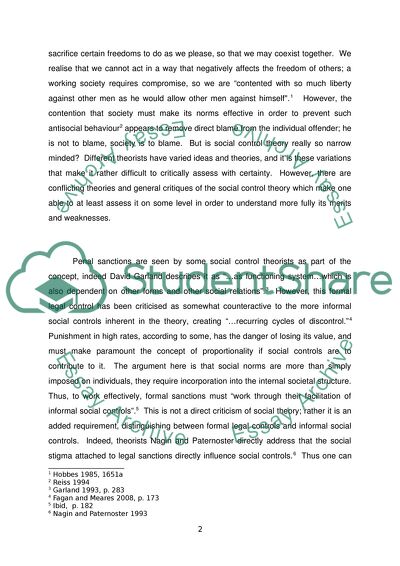
- Home
- Free Samples
- Premium Essays
- Editing Services
- Extra Tools
- Essay Writing Help
- About Us
- Studentshare
- Subjects
- Miscellaneous
- CRIMINOLOGY WRITERS ONLY: 3.Critically evaluate the claim that it is social controls that prevent us all from committing crime. You should draw on arguments from opposing bodies of theory
CRIMINOLOGY WRITERS ONLY: 3.Critically evaluate the claim that it is social controls that prevent us all from committing crime. You should draw on arguments from opposing bodies of theory - Essay Example

- Subject: Miscellaneous
- Type: Essay
- Level: Undergraduate
- Pages: 4 (1000 words)
- Downloads: 0
- Author: carlobalistreri
Extract of sample "CRIMINOLOGY WRITERS ONLY: 3.Critically evaluate the claim that it is social controls that prevent us all from committing crime. You should draw on arguments from opposing bodies of theory"
social controls, in the form of punishment for bad behaviour is expressed as deterring us from deviating from society due to the social stigmata connected to the concept of punishment itself. Members of society see those who are imprisoned for criminal behaviour as socially defective and generally attach a negative image to the offender; our inclinations to perceive other offenders in this way reinforces our desire to not be seen in the same light. Thus, in a close, strong society, good behaviour is rewarded, or at least not seen negatively – this is a form of social control which prevents us from committing deviant behaviour; it is a direct form of social control.
Additionally, internal social controls can prevent us from committing criminal behaviour; our conscience allows us to ‘know’ or at least understand what is antisocial behaviour, and thus through our desire to remain integrated into society emerges the result that we do not act unconscionably. Societal norms allow us to know what is social as opposed to antisocial behaviour – the reaction of society towards such behaviour allows us to internally see that we breach the norms of society.
Our conscience causes us to think of those close to us, and how they are to be affected by such antisocial behaviour. This deep rooted tendency of humans to comply and to integrate and be accepted provides a strong link to behavioural control. In short, we possess internalised moral codes, which are reinforced and created by the society we belong to; it is this ‘belonging’ that causes us to avoid criminal behaviour, so that we do not jeopardise our right to belong. The social control theory and all that is contained within it possesses strong tones of Thomas Hobbes’ social contract theory.
In desiring to belong to society, we sacrifice certain freedoms to do as we please, so that we may coexist together. We realise that we cannot act in a way that negatively affects the freedom of others; a working
...Download file to see next pages Read More
- TERMS & CONDITIONS
- PRIVACY POLICY
- COOKIES POLICY